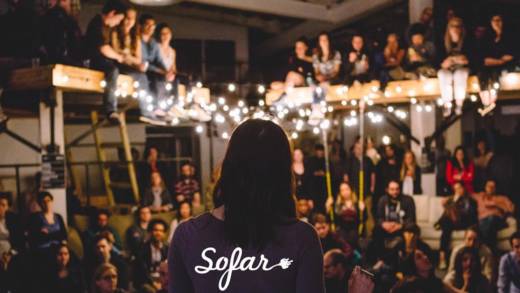Sofar Sounds—a company that books small, acoustic concerts at houses, stores and office spaces—has reached a $460,357.50 settlement with the New York State Department of Labor, Variety reports. The money will be distributed among 654 unpaid workers, or, in Sofar parlance, “ambassadors,” who staffed concerts for the for-profit company between 2016 and 2019.
Concert Startup Sofar Sounds to Pay $460,000 to Uncompensated Workers

The settlement comes after years of scrutiny of Sofar Sounds’ business model. Since its debut in London in 2009, the startup expanded to hundreds of cities across the globe, including San Francisco, Santa Cruz and San Jose, and became profitable by charging at the door for “secret shows” while using volunteer crews and paying musicians negligible stipends. When KQED’s Emma Silvers broke the story of Sofar Sounds’ labor practices in 2017, the company was valued at an estimated $22 million, with investment from Virgin’s Richard Branson. Meanwhile, bands were compensated with videos of their performances (and no cash), and then paid $50 per concert once they became “Sofar alums” and played additional shows.
“I think they talk a lot about supporting local artists, but what they’re actually doing is perpetuating the idea that it’s okay for musicians to get paid shit,” Oakland singer-songwriter Madeline Kinney told KQED at the time.
In 2019, TechCrunch reported that Sofar upped its fees to $100 per band for a 25 minute set (which can work out to less than minimum wage when factoring in musicians’ travel and rehearsal time). The hosts who volunteered their homes as venues weren’t paid, yet Sofar made at least $1,000 to $1,600 per show, according to the report. In a recent blog post, Sofar CEO Jim Lucchese promised to increase artist compensation for bigger shows in February 2020. In September 2019, the company also pledged to hire paid, part-time crews to staff its concerts.
“When the Department of Labor opened its investigation, Sofar cooperated fully and immediately changed its business model,” the New York State Department of Labor wrote in an announcement. “Sofar now staffs all its events with paid employees. The company also agreed to immediately compensate ambassadors who provided any unpaid work.”
After the settlement was reached, a Sofar spokesperson told Variety: “Today’s agreement with the New York State Department of Labor stipulates no admission of guilt or wrongdoing and confirms our operating model is fully compliant with New York state law. We thank them for working collaboratively with us in New York, Sofar’s biggest U.S. market. We are excited about resolving these issues and moving forward in 2020, with a continued focus on connecting local and independent musicians with passionate music fans.”

